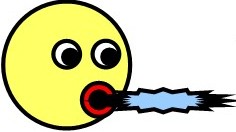I saw in yesterday's news that Don Adams died at age 82. If you're of a certain age, you remember him as Maxwell Smart from the TV comedy "Get Smart," or perhaps as the voice of the cartoon character Tennessee Tuxedo.
I was thinking about this last night while getting ready for work, about how quaint "Get Smart" and other TV shows from the early-to-mid 1960s seem in retrospect. There was a cultural sea change that happened during that time, and the way that people dressed and behaved changed radically some time around 1967 or so. The Summer of Love marked the end of the reign of the fedora-wearing man in the gray flannel suit almost as surely as the asteroid that killed off the dinosaurs.
Even into the early 1960s, all men wore hats everywhere they went. A man wasn't completely dressed without one. If you look at archival film footage from the 1930s or 1940s or 1950s, you notice it: They were all wearing hats. And then you look at film from the 1970s, and you notice that very few men were wearing them any longer. The ones who did still have hats from then on were wearing them as part of a uniform: Military, law enforcement, culinary, sports. But for John Doe, the hat was no longer required or even desired.
I think that the man who single-handedly killed the haberdashery industry was President John F. Kennedy. Sure, he died in 1963, a few years before hats almost completely disappeared, but he was the one who set the hatless trend by appearing bareheaded at his inauguration. The die was cast; hats were no longer fashionable. The dinosaurs didn't all die off at once, either; it took a little time. It's always been my pet theory that the haberdashers were the ones who had Kennedy assassinated. Do you know what Harry Truman did before he entered politics? He was a haberdasher in Kansas City. Really.

